Professional Development, Skills, and Learning Theories for Hilton
VerifiedAdded on 2021/02/19
|9
|2279
|452
Report
AI Summary
This report delves into the realm of professional identity and practice within the context of the Hilton Hotel. It begins by exploring the key benefits of ongoing professional development for various stakeholders, including employers and employees, highlighting how such development enhances efficiency, skill advancement, and job satisfaction. The report then investigates the professional expectations of employers, focusing on crucial skills like communication, problem-solving, and decision-making, as well as competencies such as commercial awareness and teamwork. A self-assessment of skills and competencies, including a SWOT analysis, is provided from the perspective of an HR manager. The report also examines a range of learning theories and approaches, such as cognitivism, constructivism, Kolb’s Learning Cycle, and VARK learning styles, emphasizing their importance in fostering continuous learning and skill acquisition within the organization. The conclusion underscores the significance of professional development in achieving organizational goals and enhancing employee capabilities.
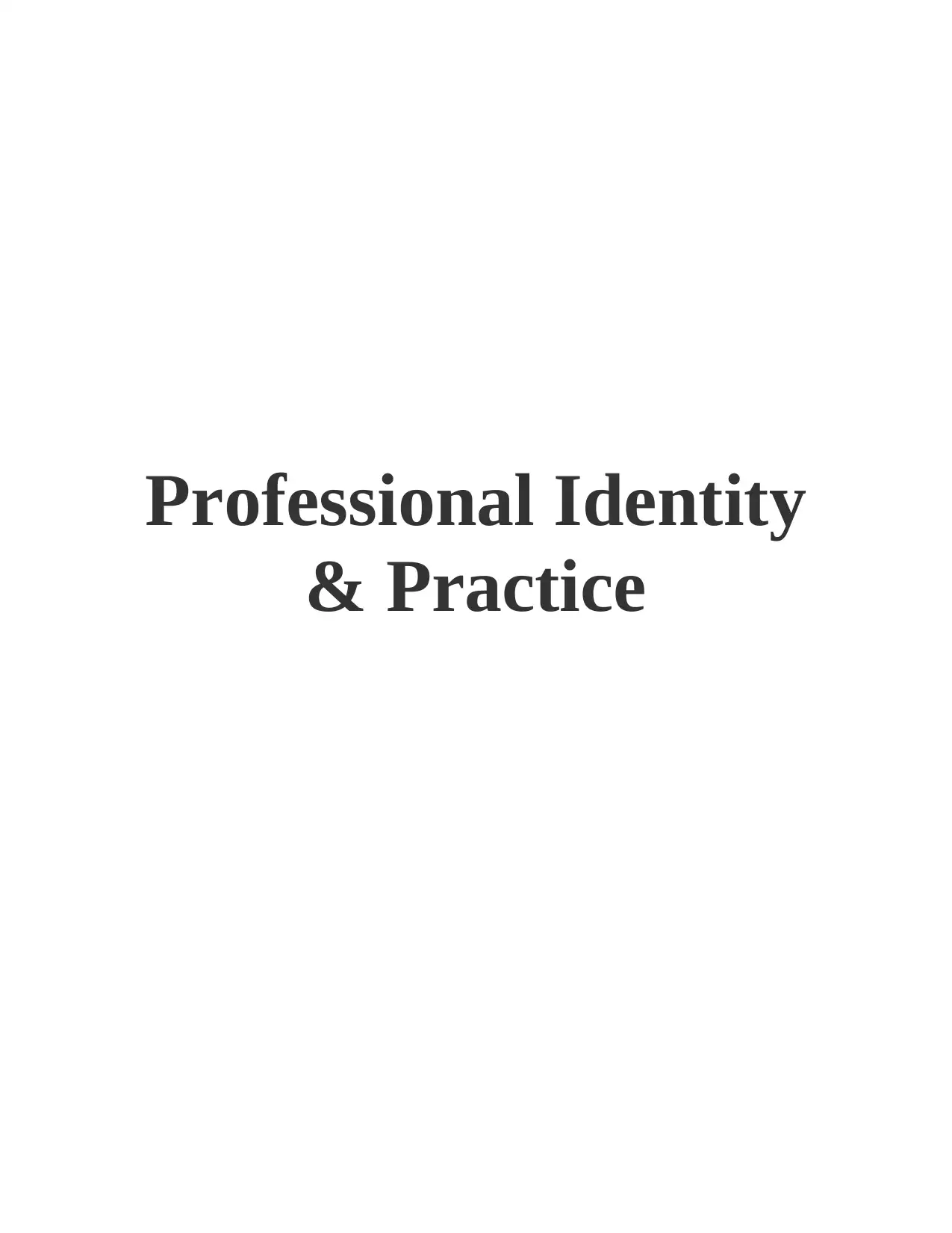
Professional Identity
& Practice
& Practice
Paraphrase This Document
Need a fresh take? Get an instant paraphrase of this document with our AI Paraphraser
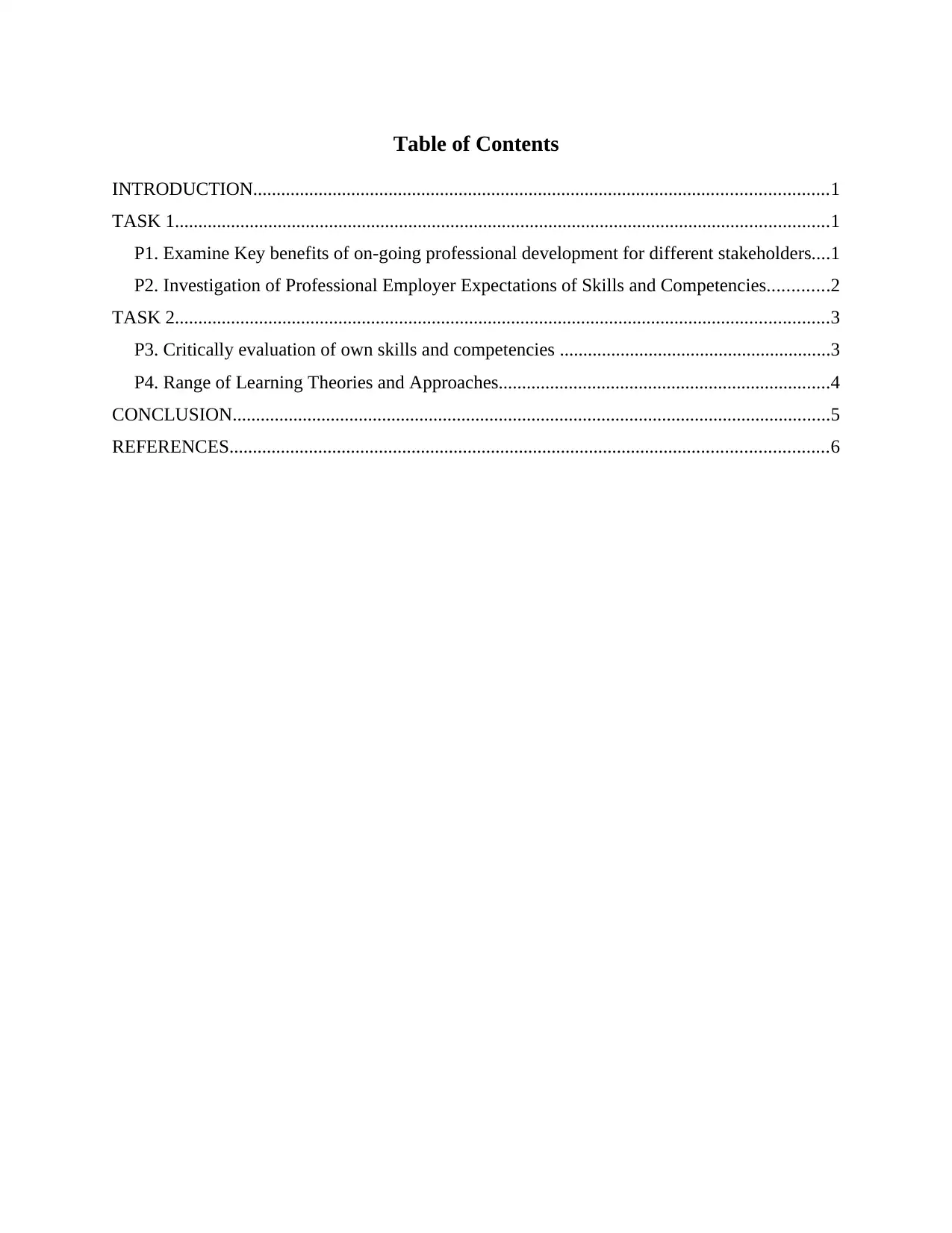
Table of Contents
INTRODUCTION...........................................................................................................................1
TASK 1............................................................................................................................................1
P1. Examine Key benefits of on-going professional development for different stakeholders....1
P2. Investigation of Professional Employer Expectations of Skills and Competencies.............2
TASK 2............................................................................................................................................3
P3. Critically evaluation of own skills and competencies ..........................................................3
P4. Range of Learning Theories and Approaches.......................................................................4
CONCLUSION................................................................................................................................5
REFERENCES................................................................................................................................6
INTRODUCTION...........................................................................................................................1
TASK 1............................................................................................................................................1
P1. Examine Key benefits of on-going professional development for different stakeholders....1
P2. Investigation of Professional Employer Expectations of Skills and Competencies.............2
TASK 2............................................................................................................................................3
P3. Critically evaluation of own skills and competencies ..........................................................3
P4. Range of Learning Theories and Approaches.......................................................................4
CONCLUSION................................................................................................................................5
REFERENCES................................................................................................................................6
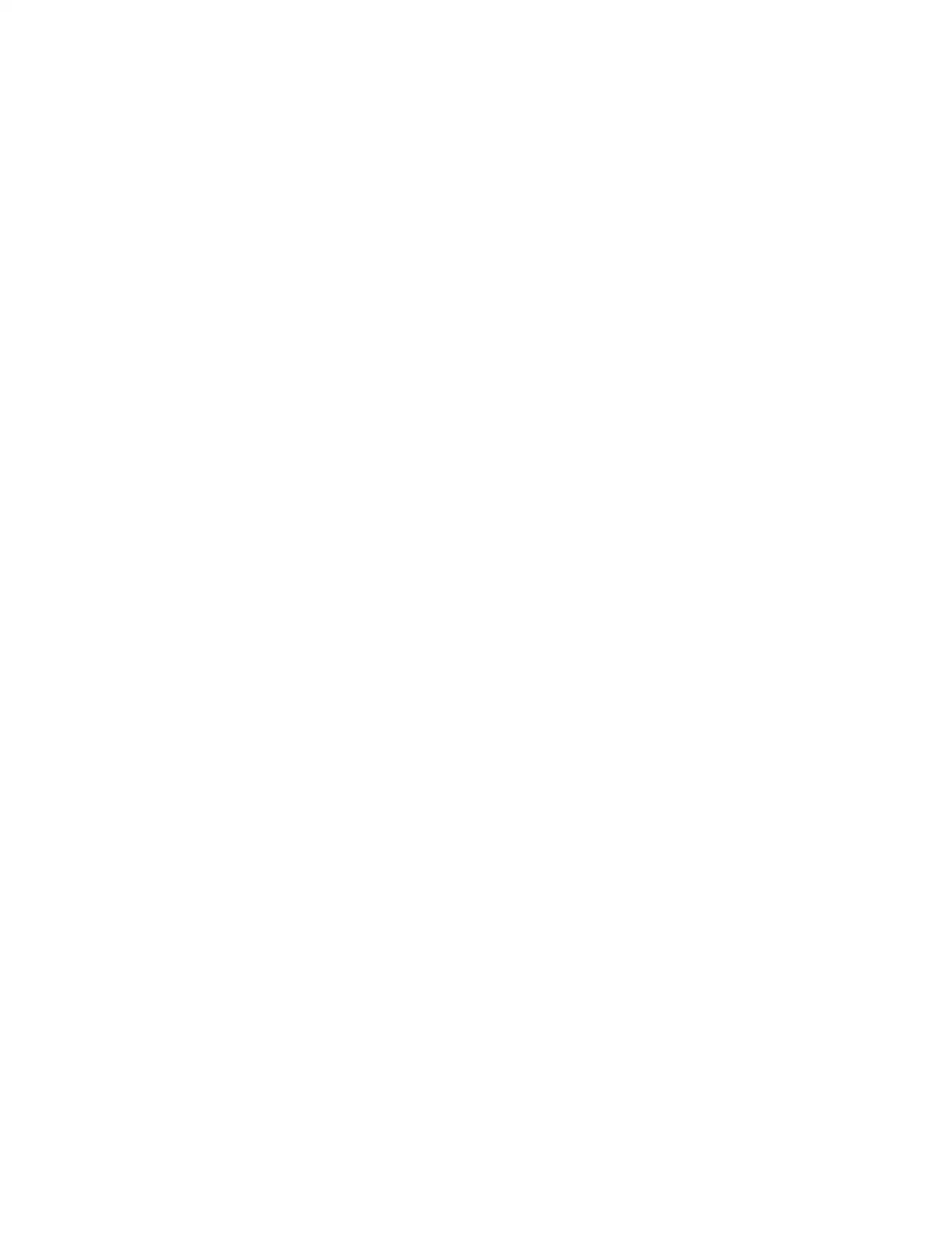
⊘ This is a preview!⊘
Do you want full access?
Subscribe today to unlock all pages.

Trusted by 1+ million students worldwide
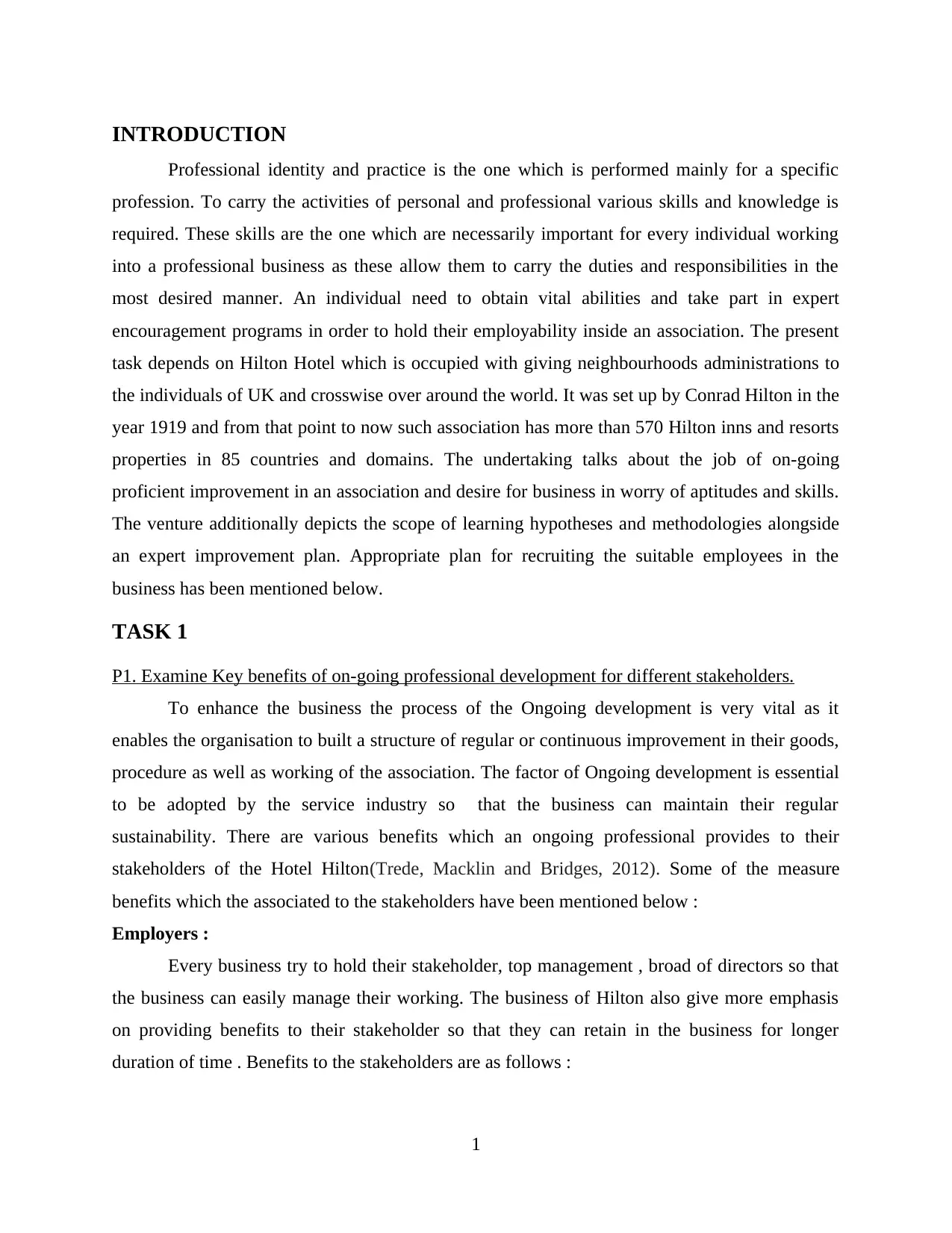
INTRODUCTION
Professional identity and practice is the one which is performed mainly for a specific
profession. To carry the activities of personal and professional various skills and knowledge is
required. These skills are the one which are necessarily important for every individual working
into a professional business as these allow them to carry the duties and responsibilities in the
most desired manner. An individual need to obtain vital abilities and take part in expert
encouragement programs in order to hold their employability inside an association. The present
task depends on Hilton Hotel which is occupied with giving neighbourhoods administrations to
the individuals of UK and crosswise over around the world. It was set up by Conrad Hilton in the
year 1919 and from that point to now such association has more than 570 Hilton inns and resorts
properties in 85 countries and domains. The undertaking talks about the job of on-going
proficient improvement in an association and desire for business in worry of aptitudes and skills.
The venture additionally depicts the scope of learning hypotheses and methodologies alongside
an expert improvement plan. Appropriate plan for recruiting the suitable employees in the
business has been mentioned below.
TASK 1
P1. Examine Key benefits of on-going professional development for different stakeholders.
To enhance the business the process of the Ongoing development is very vital as it
enables the organisation to built a structure of regular or continuous improvement in their goods,
procedure as well as working of the association. The factor of Ongoing development is essential
to be adopted by the service industry so that the business can maintain their regular
sustainability. There are various benefits which an ongoing professional provides to their
stakeholders of the Hotel Hilton(Trede, Macklin and Bridges, 2012). Some of the measure
benefits which the associated to the stakeholders have been mentioned below :
Employers :
Every business try to hold their stakeholder, top management , broad of directors so that
the business can easily manage their working. The business of Hilton also give more emphasis
on providing benefits to their stakeholder so that they can retain in the business for longer
duration of time . Benefits to the stakeholders are as follows :
1
Professional identity and practice is the one which is performed mainly for a specific
profession. To carry the activities of personal and professional various skills and knowledge is
required. These skills are the one which are necessarily important for every individual working
into a professional business as these allow them to carry the duties and responsibilities in the
most desired manner. An individual need to obtain vital abilities and take part in expert
encouragement programs in order to hold their employability inside an association. The present
task depends on Hilton Hotel which is occupied with giving neighbourhoods administrations to
the individuals of UK and crosswise over around the world. It was set up by Conrad Hilton in the
year 1919 and from that point to now such association has more than 570 Hilton inns and resorts
properties in 85 countries and domains. The undertaking talks about the job of on-going
proficient improvement in an association and desire for business in worry of aptitudes and skills.
The venture additionally depicts the scope of learning hypotheses and methodologies alongside
an expert improvement plan. Appropriate plan for recruiting the suitable employees in the
business has been mentioned below.
TASK 1
P1. Examine Key benefits of on-going professional development for different stakeholders.
To enhance the business the process of the Ongoing development is very vital as it
enables the organisation to built a structure of regular or continuous improvement in their goods,
procedure as well as working of the association. The factor of Ongoing development is essential
to be adopted by the service industry so that the business can maintain their regular
sustainability. There are various benefits which an ongoing professional provides to their
stakeholders of the Hotel Hilton(Trede, Macklin and Bridges, 2012). Some of the measure
benefits which the associated to the stakeholders have been mentioned below :
Employers :
Every business try to hold their stakeholder, top management , broad of directors so that
the business can easily manage their working. The business of Hilton also give more emphasis
on providing benefits to their stakeholder so that they can retain in the business for longer
duration of time . Benefits to the stakeholders are as follows :
1
Paraphrase This Document
Need a fresh take? Get an instant paraphrase of this document with our AI Paraphraser
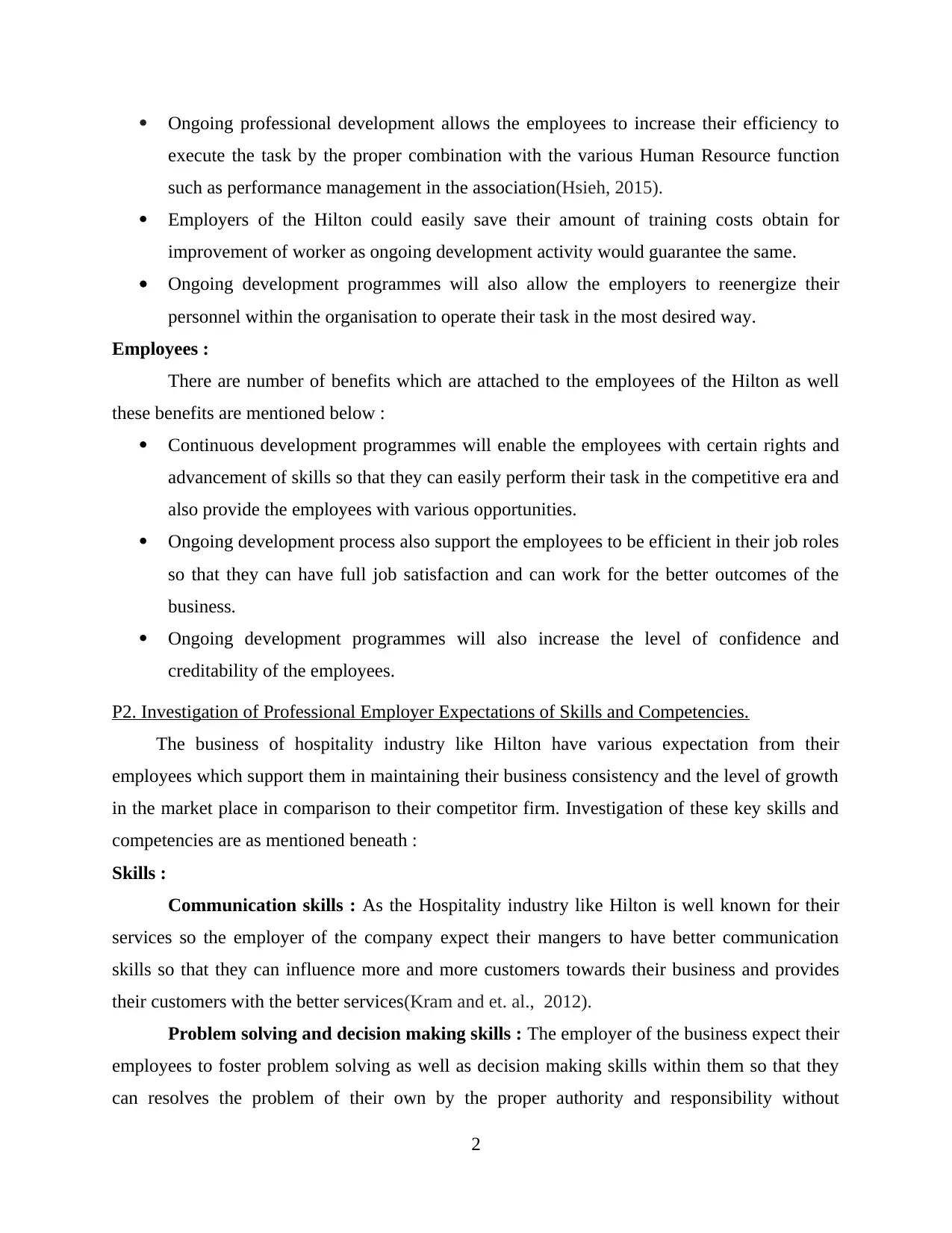
Ongoing professional development allows the employees to increase their efficiency to
execute the task by the proper combination with the various Human Resource function
such as performance management in the association(Hsieh, 2015).
Employers of the Hilton could easily save their amount of training costs obtain for
improvement of worker as ongoing development activity would guarantee the same.
Ongoing development programmes will also allow the employers to reenergize their
personnel within the organisation to operate their task in the most desired way.
Employees :
There are number of benefits which are attached to the employees of the Hilton as well
these benefits are mentioned below :
Continuous development programmes will enable the employees with certain rights and
advancement of skills so that they can easily perform their task in the competitive era and
also provide the employees with various opportunities.
Ongoing development process also support the employees to be efficient in their job roles
so that they can have full job satisfaction and can work for the better outcomes of the
business.
Ongoing development programmes will also increase the level of confidence and
creditability of the employees.
P2. Investigation of Professional Employer Expectations of Skills and Competencies.
The business of hospitality industry like Hilton have various expectation from their
employees which support them in maintaining their business consistency and the level of growth
in the market place in comparison to their competitor firm. Investigation of these key skills and
competencies are as mentioned beneath :
Skills :
Communication skills : As the Hospitality industry like Hilton is well known for their
services so the employer of the company expect their mangers to have better communication
skills so that they can influence more and more customers towards their business and provides
their customers with the better services(Kram and et. al., 2012).
Problem solving and decision making skills : The employer of the business expect their
employees to foster problem solving as well as decision making skills within them so that they
can resolves the problem of their own by the proper authority and responsibility without
2
execute the task by the proper combination with the various Human Resource function
such as performance management in the association(Hsieh, 2015).
Employers of the Hilton could easily save their amount of training costs obtain for
improvement of worker as ongoing development activity would guarantee the same.
Ongoing development programmes will also allow the employers to reenergize their
personnel within the organisation to operate their task in the most desired way.
Employees :
There are number of benefits which are attached to the employees of the Hilton as well
these benefits are mentioned below :
Continuous development programmes will enable the employees with certain rights and
advancement of skills so that they can easily perform their task in the competitive era and
also provide the employees with various opportunities.
Ongoing development process also support the employees to be efficient in their job roles
so that they can have full job satisfaction and can work for the better outcomes of the
business.
Ongoing development programmes will also increase the level of confidence and
creditability of the employees.
P2. Investigation of Professional Employer Expectations of Skills and Competencies.
The business of hospitality industry like Hilton have various expectation from their
employees which support them in maintaining their business consistency and the level of growth
in the market place in comparison to their competitor firm. Investigation of these key skills and
competencies are as mentioned beneath :
Skills :
Communication skills : As the Hospitality industry like Hilton is well known for their
services so the employer of the company expect their mangers to have better communication
skills so that they can influence more and more customers towards their business and provides
their customers with the better services(Kram and et. al., 2012).
Problem solving and decision making skills : The employer of the business expect their
employees to foster problem solving as well as decision making skills within them so that they
can resolves the problem of their own by the proper authority and responsibility without
2
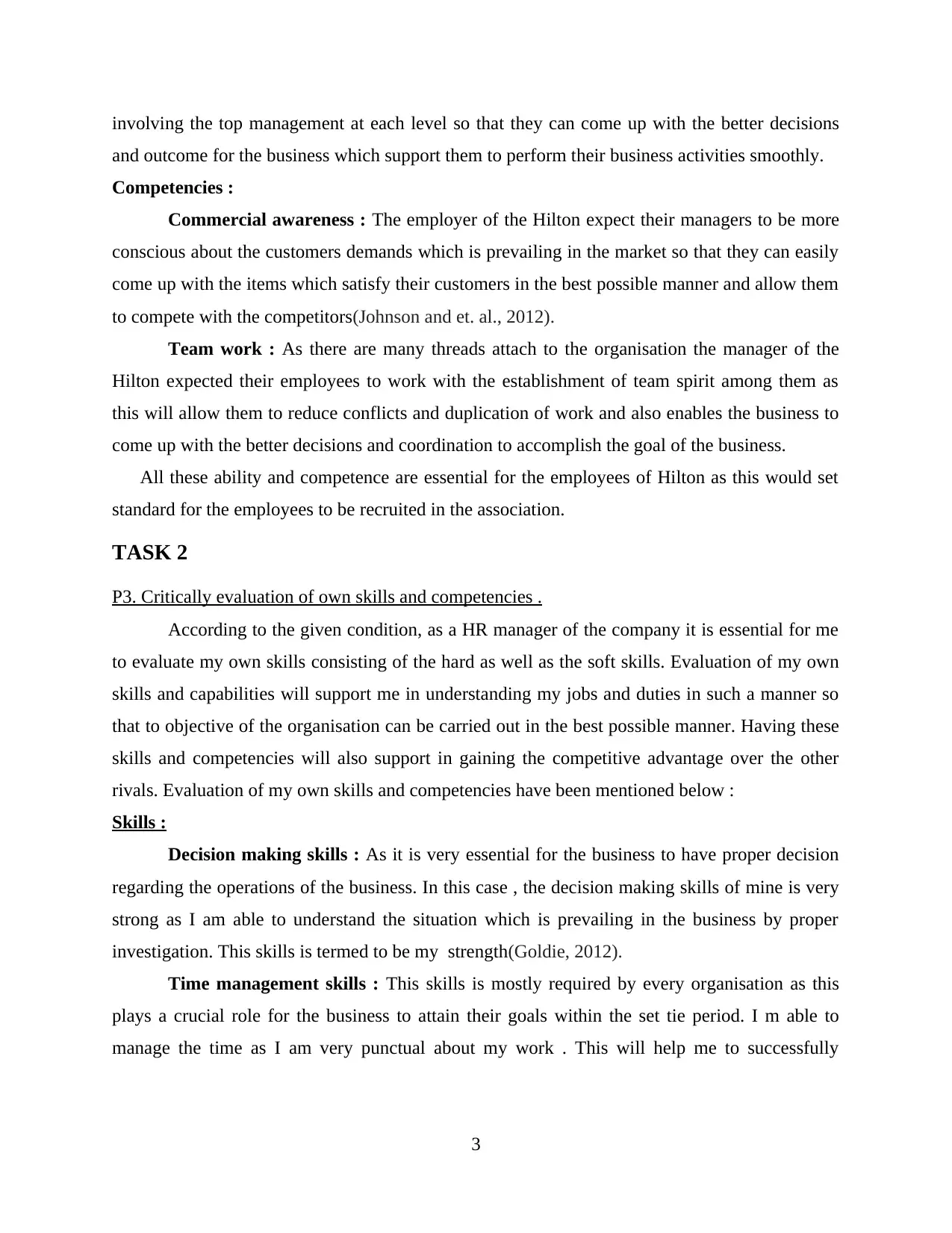
involving the top management at each level so that they can come up with the better decisions
and outcome for the business which support them to perform their business activities smoothly.
Competencies :
Commercial awareness : The employer of the Hilton expect their managers to be more
conscious about the customers demands which is prevailing in the market so that they can easily
come up with the items which satisfy their customers in the best possible manner and allow them
to compete with the competitors(Johnson and et. al., 2012).
Team work : As there are many threads attach to the organisation the manager of the
Hilton expected their employees to work with the establishment of team spirit among them as
this will allow them to reduce conflicts and duplication of work and also enables the business to
come up with the better decisions and coordination to accomplish the goal of the business.
All these ability and competence are essential for the employees of Hilton as this would set
standard for the employees to be recruited in the association.
TASK 2
P3. Critically evaluation of own skills and competencies .
According to the given condition, as a HR manager of the company it is essential for me
to evaluate my own skills consisting of the hard as well as the soft skills. Evaluation of my own
skills and capabilities will support me in understanding my jobs and duties in such a manner so
that to objective of the organisation can be carried out in the best possible manner. Having these
skills and competencies will also support in gaining the competitive advantage over the other
rivals. Evaluation of my own skills and competencies have been mentioned below :
Skills :
Decision making skills : As it is very essential for the business to have proper decision
regarding the operations of the business. In this case , the decision making skills of mine is very
strong as I am able to understand the situation which is prevailing in the business by proper
investigation. This skills is termed to be my strength(Goldie, 2012).
Time management skills : This skills is mostly required by every organisation as this
plays a crucial role for the business to attain their goals within the set tie period. I m able to
manage the time as I am very punctual about my work . This will help me to successfully
3
and outcome for the business which support them to perform their business activities smoothly.
Competencies :
Commercial awareness : The employer of the Hilton expect their managers to be more
conscious about the customers demands which is prevailing in the market so that they can easily
come up with the items which satisfy their customers in the best possible manner and allow them
to compete with the competitors(Johnson and et. al., 2012).
Team work : As there are many threads attach to the organisation the manager of the
Hilton expected their employees to work with the establishment of team spirit among them as
this will allow them to reduce conflicts and duplication of work and also enables the business to
come up with the better decisions and coordination to accomplish the goal of the business.
All these ability and competence are essential for the employees of Hilton as this would set
standard for the employees to be recruited in the association.
TASK 2
P3. Critically evaluation of own skills and competencies .
According to the given condition, as a HR manager of the company it is essential for me
to evaluate my own skills consisting of the hard as well as the soft skills. Evaluation of my own
skills and capabilities will support me in understanding my jobs and duties in such a manner so
that to objective of the organisation can be carried out in the best possible manner. Having these
skills and competencies will also support in gaining the competitive advantage over the other
rivals. Evaluation of my own skills and competencies have been mentioned below :
Skills :
Decision making skills : As it is very essential for the business to have proper decision
regarding the operations of the business. In this case , the decision making skills of mine is very
strong as I am able to understand the situation which is prevailing in the business by proper
investigation. This skills is termed to be my strength(Goldie, 2012).
Time management skills : This skills is mostly required by every organisation as this
plays a crucial role for the business to attain their goals within the set tie period. I m able to
manage the time as I am very punctual about my work . This will help me to successfully
3
⊘ This is a preview!⊘
Do you want full access?
Subscribe today to unlock all pages.

Trusted by 1+ million students worldwide
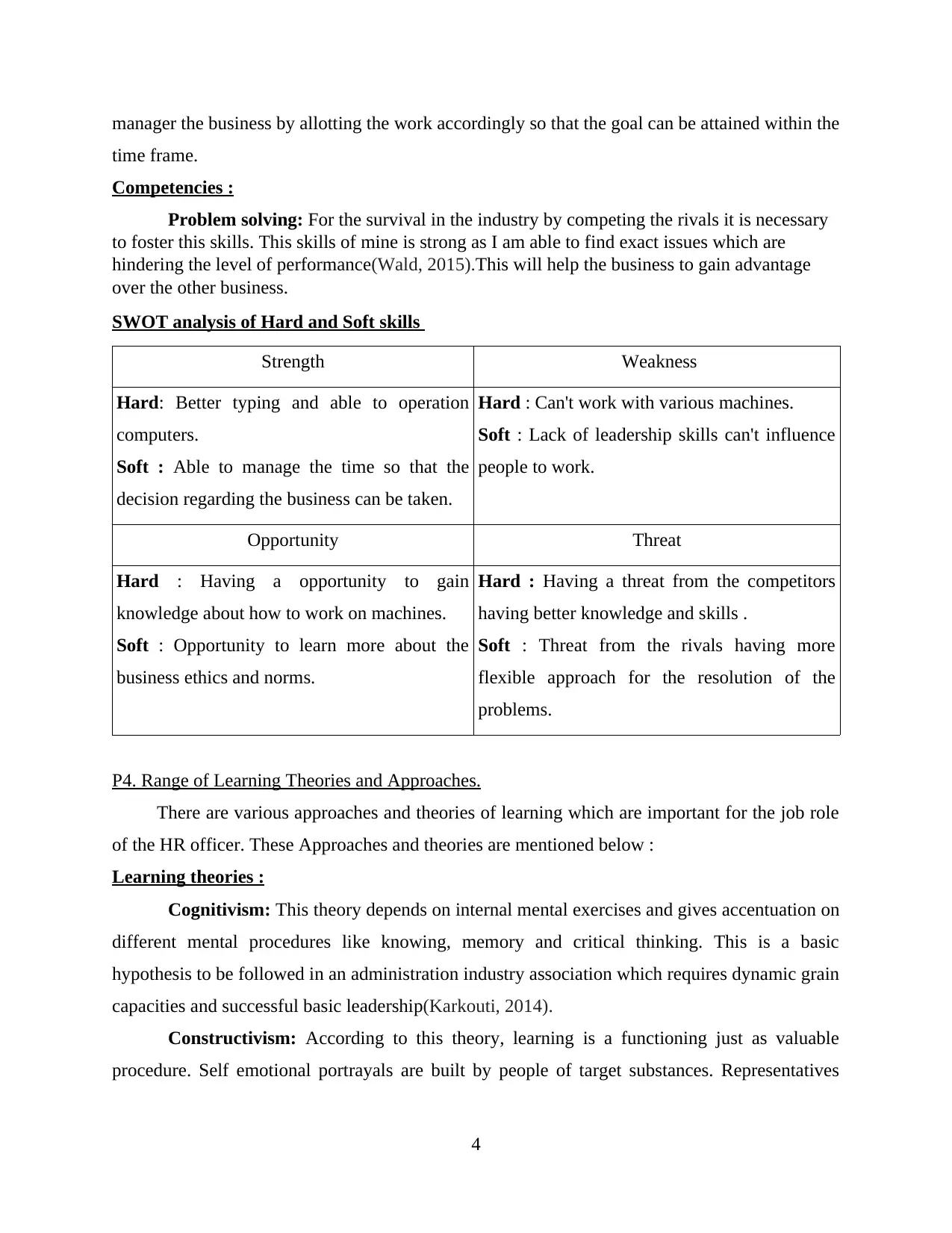
manager the business by allotting the work accordingly so that the goal can be attained within the
time frame.
Competencies :
Problem solving: For the survival in the industry by competing the rivals it is necessary
to foster this skills. This skills of mine is strong as I am able to find exact issues which are
hindering the level of performance(Wald, 2015).This will help the business to gain advantage
over the other business.
SWOT analysis of Hard and Soft skills
Strength Weakness
Hard: Better typing and able to operation
computers.
Soft : Able to manage the time so that the
decision regarding the business can be taken.
Hard : Can't work with various machines.
Soft : Lack of leadership skills can't influence
people to work.
Opportunity Threat
Hard : Having a opportunity to gain
knowledge about how to work on machines.
Soft : Opportunity to learn more about the
business ethics and norms.
Hard : Having a threat from the competitors
having better knowledge and skills .
Soft : Threat from the rivals having more
flexible approach for the resolution of the
problems.
P4. Range of Learning Theories and Approaches.
There are various approaches and theories of learning which are important for the job role
of the HR officer. These Approaches and theories are mentioned below :
Learning theories :
Cognitivism: This theory depends on internal mental exercises and gives accentuation on
different mental procedures like knowing, memory and critical thinking. This is a basic
hypothesis to be followed in an administration industry association which requires dynamic grain
capacities and successful basic leadership(Karkouti, 2014).
Constructivism: According to this theory, learning is a functioning just as valuable
procedure. Self emotional portrayals are built by people of target substances. Representatives
4
time frame.
Competencies :
Problem solving: For the survival in the industry by competing the rivals it is necessary
to foster this skills. This skills of mine is strong as I am able to find exact issues which are
hindering the level of performance(Wald, 2015).This will help the business to gain advantage
over the other business.
SWOT analysis of Hard and Soft skills
Strength Weakness
Hard: Better typing and able to operation
computers.
Soft : Able to manage the time so that the
decision regarding the business can be taken.
Hard : Can't work with various machines.
Soft : Lack of leadership skills can't influence
people to work.
Opportunity Threat
Hard : Having a opportunity to gain
knowledge about how to work on machines.
Soft : Opportunity to learn more about the
business ethics and norms.
Hard : Having a threat from the competitors
having better knowledge and skills .
Soft : Threat from the rivals having more
flexible approach for the resolution of the
problems.
P4. Range of Learning Theories and Approaches.
There are various approaches and theories of learning which are important for the job role
of the HR officer. These Approaches and theories are mentioned below :
Learning theories :
Cognitivism: This theory depends on internal mental exercises and gives accentuation on
different mental procedures like knowing, memory and critical thinking. This is a basic
hypothesis to be followed in an administration industry association which requires dynamic grain
capacities and successful basic leadership(Karkouti, 2014).
Constructivism: According to this theory, learning is a functioning just as valuable
procedure. Self emotional portrayals are built by people of target substances. Representatives
4
Paraphrase This Document
Need a fresh take? Get an instant paraphrase of this document with our AI Paraphraser
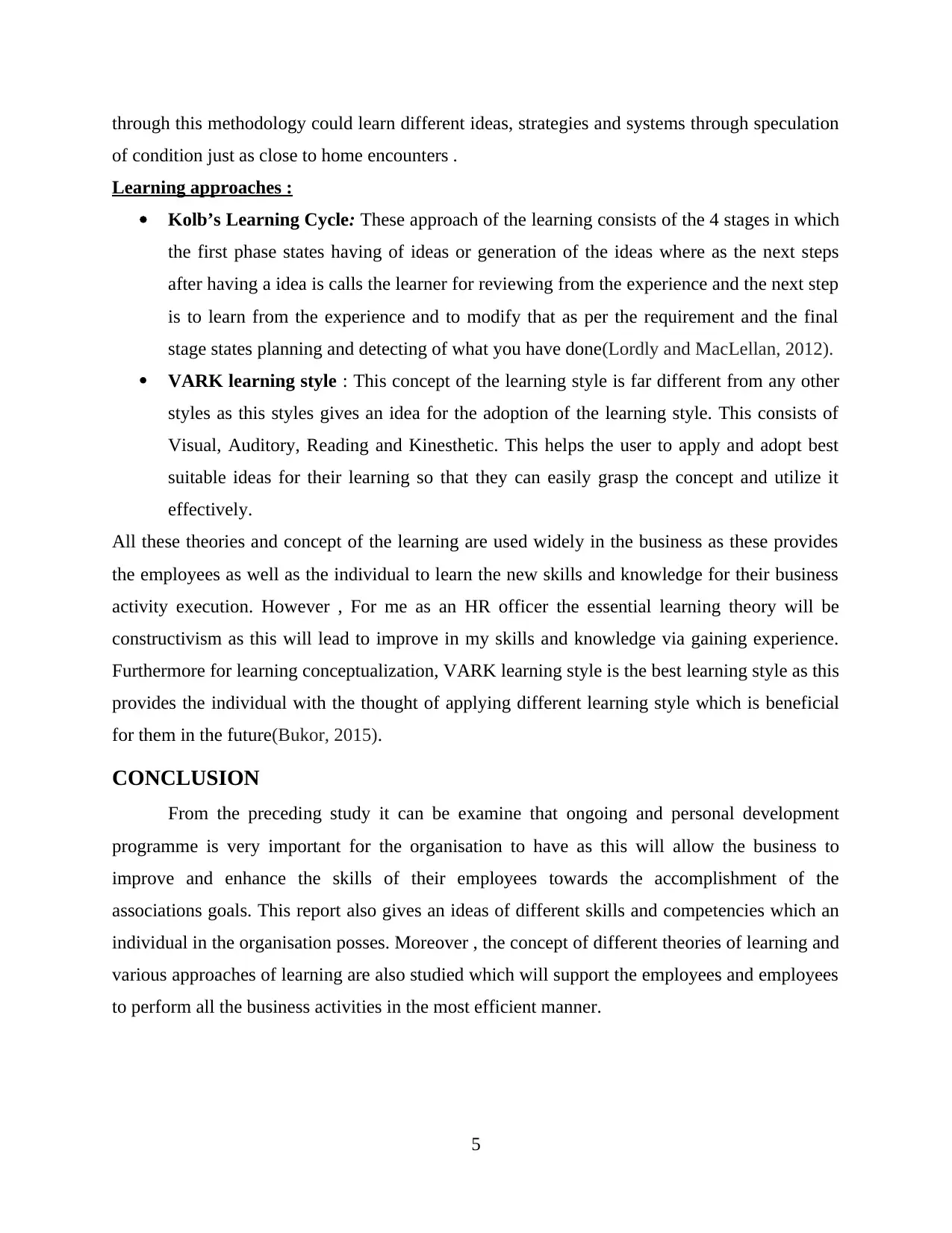
through this methodology could learn different ideas, strategies and systems through speculation
of condition just as close to home encounters .
Learning approaches :
Kolb’s Learning Cycle: These approach of the learning consists of the 4 stages in which
the first phase states having of ideas or generation of the ideas where as the next steps
after having a idea is calls the learner for reviewing from the experience and the next step
is to learn from the experience and to modify that as per the requirement and the final
stage states planning and detecting of what you have done(Lordly and MacLellan, 2012).
VARK learning style : This concept of the learning style is far different from any other
styles as this styles gives an idea for the adoption of the learning style. This consists of
Visual, Auditory, Reading and Kinesthetic. This helps the user to apply and adopt best
suitable ideas for their learning so that they can easily grasp the concept and utilize it
effectively.
All these theories and concept of the learning are used widely in the business as these provides
the employees as well as the individual to learn the new skills and knowledge for their business
activity execution. However , For me as an HR officer the essential learning theory will be
constructivism as this will lead to improve in my skills and knowledge via gaining experience.
Furthermore for learning conceptualization, VARK learning style is the best learning style as this
provides the individual with the thought of applying different learning style which is beneficial
for them in the future(Bukor, 2015).
CONCLUSION
From the preceding study it can be examine that ongoing and personal development
programme is very important for the organisation to have as this will allow the business to
improve and enhance the skills of their employees towards the accomplishment of the
associations goals. This report also gives an ideas of different skills and competencies which an
individual in the organisation posses. Moreover , the concept of different theories of learning and
various approaches of learning are also studied which will support the employees and employees
to perform all the business activities in the most efficient manner.
5
of condition just as close to home encounters .
Learning approaches :
Kolb’s Learning Cycle: These approach of the learning consists of the 4 stages in which
the first phase states having of ideas or generation of the ideas where as the next steps
after having a idea is calls the learner for reviewing from the experience and the next step
is to learn from the experience and to modify that as per the requirement and the final
stage states planning and detecting of what you have done(Lordly and MacLellan, 2012).
VARK learning style : This concept of the learning style is far different from any other
styles as this styles gives an idea for the adoption of the learning style. This consists of
Visual, Auditory, Reading and Kinesthetic. This helps the user to apply and adopt best
suitable ideas for their learning so that they can easily grasp the concept and utilize it
effectively.
All these theories and concept of the learning are used widely in the business as these provides
the employees as well as the individual to learn the new skills and knowledge for their business
activity execution. However , For me as an HR officer the essential learning theory will be
constructivism as this will lead to improve in my skills and knowledge via gaining experience.
Furthermore for learning conceptualization, VARK learning style is the best learning style as this
provides the individual with the thought of applying different learning style which is beneficial
for them in the future(Bukor, 2015).
CONCLUSION
From the preceding study it can be examine that ongoing and personal development
programme is very important for the organisation to have as this will allow the business to
improve and enhance the skills of their employees towards the accomplishment of the
associations goals. This report also gives an ideas of different skills and competencies which an
individual in the organisation posses. Moreover , the concept of different theories of learning and
various approaches of learning are also studied which will support the employees and employees
to perform all the business activities in the most efficient manner.
5
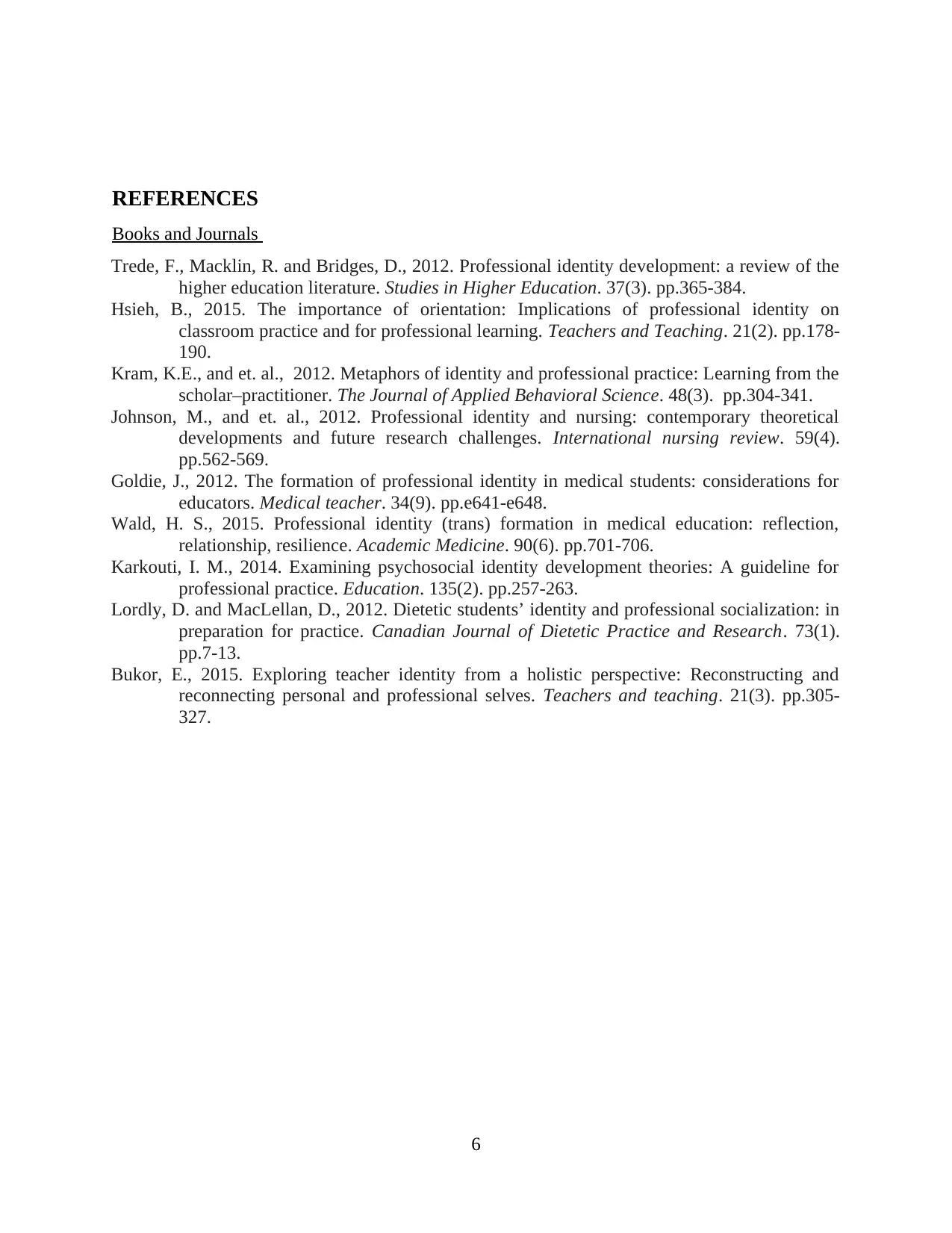
REFERENCES
Books and Journals
Trede, F., Macklin, R. and Bridges, D., 2012. Professional identity development: a review of the
higher education literature. Studies in Higher Education. 37(3). pp.365-384.
Hsieh, B., 2015. The importance of orientation: Implications of professional identity on
classroom practice and for professional learning. Teachers and Teaching. 21(2). pp.178-
190.
Kram, K.E., and et. al., 2012. Metaphors of identity and professional practice: Learning from the
scholar–practitioner. The Journal of Applied Behavioral Science. 48(3). pp.304-341.
Johnson, M., and et. al., 2012. Professional identity and nursing: contemporary theoretical
developments and future research challenges. International nursing review. 59(4).
pp.562-569.
Goldie, J., 2012. The formation of professional identity in medical students: considerations for
educators. Medical teacher. 34(9). pp.e641-e648.
Wald, H. S., 2015. Professional identity (trans) formation in medical education: reflection,
relationship, resilience. Academic Medicine. 90(6). pp.701-706.
Karkouti, I. M., 2014. Examining psychosocial identity development theories: A guideline for
professional practice. Education. 135(2). pp.257-263.
Lordly, D. and MacLellan, D., 2012. Dietetic students’ identity and professional socialization: in
preparation for practice. Canadian Journal of Dietetic Practice and Research. 73(1).
pp.7-13.
Bukor, E., 2015. Exploring teacher identity from a holistic perspective: Reconstructing and
reconnecting personal and professional selves. Teachers and teaching. 21(3). pp.305-
327.
6
Books and Journals
Trede, F., Macklin, R. and Bridges, D., 2012. Professional identity development: a review of the
higher education literature. Studies in Higher Education. 37(3). pp.365-384.
Hsieh, B., 2015. The importance of orientation: Implications of professional identity on
classroom practice and for professional learning. Teachers and Teaching. 21(2). pp.178-
190.
Kram, K.E., and et. al., 2012. Metaphors of identity and professional practice: Learning from the
scholar–practitioner. The Journal of Applied Behavioral Science. 48(3). pp.304-341.
Johnson, M., and et. al., 2012. Professional identity and nursing: contemporary theoretical
developments and future research challenges. International nursing review. 59(4).
pp.562-569.
Goldie, J., 2012. The formation of professional identity in medical students: considerations for
educators. Medical teacher. 34(9). pp.e641-e648.
Wald, H. S., 2015. Professional identity (trans) formation in medical education: reflection,
relationship, resilience. Academic Medicine. 90(6). pp.701-706.
Karkouti, I. M., 2014. Examining psychosocial identity development theories: A guideline for
professional practice. Education. 135(2). pp.257-263.
Lordly, D. and MacLellan, D., 2012. Dietetic students’ identity and professional socialization: in
preparation for practice. Canadian Journal of Dietetic Practice and Research. 73(1).
pp.7-13.
Bukor, E., 2015. Exploring teacher identity from a holistic perspective: Reconstructing and
reconnecting personal and professional selves. Teachers and teaching. 21(3). pp.305-
327.
6
⊘ This is a preview!⊘
Do you want full access?
Subscribe today to unlock all pages.

Trusted by 1+ million students worldwide
1 out of 9
Related Documents
Your All-in-One AI-Powered Toolkit for Academic Success.
+13062052269
info@desklib.com
Available 24*7 on WhatsApp / Email
![[object Object]](/_next/static/media/star-bottom.7253800d.svg)
Unlock your academic potential
Copyright © 2020–2026 A2Z Services. All Rights Reserved. Developed and managed by ZUCOL.





